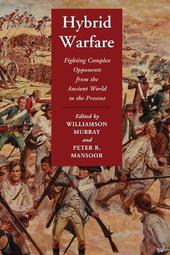
|
Hybrid Warfare: Fighting Complex Opponents from the Ancient World to the Present
Paperback / softback
Main Details
| Title |
Hybrid Warfare: Fighting Complex Opponents from the Ancient World to the Present
|
| Authors and Contributors |
Edited by Williamson Murray
|
|
Edited by Peter R. Mansoor
|
| Physical Properties |
| Format:Paperback / softback | | Pages:334 | | Dimensions(mm): Height 229,Width 152 |
|
| Category/Genre | Military history |
|---|
| ISBN/Barcode |
9781107643338
|
| Classifications | Dewey:355.0209 |
|---|
| Audience | | Tertiary Education (US: College) | | Professional & Vocational | |
|---|
| Illustrations |
9 Maps
|
|
Publishing Details |
| Publisher |
Cambridge University Press
|
| Imprint |
Cambridge University Press
|
| Publication Date |
9 July 2012 |
| Publication Country |
United Kingdom
|
Description
Hybrid warfare has been an integral part of the historical landscape since the ancient world, but only recently have analysts - incorrectly - categorised these conflicts as unique. Great powers throughout history have confronted opponents who used a combination of regular and irregular forces to negate the advantage of the great powers' superior conventional military strength. As this study shows, hybrid wars are labour-intensive and long-term affairs; they are difficult struggles that defy the domestic logic of opinion polls and election cycles. Hybrid wars are also the most likely conflicts of the twenty-first century, as competitors use hybrid forces to wear down America's military capabilities in extended campaigns of exhaustion. Nine historical examples of hybrid warfare, from ancient Rome to the modern world, provide readers with context by clarifying the various aspects of conflicts and examining how great powers have dealt with them in the past.
Author Biography
Williamson Murray is Professor Emeritus of History at Ohio State University. At present he is a defense consultant and commentator on historical and military subjects in Washington. He is the author of War, Strategy, and Military Effectiveness and Military Adaptation in War (both Cambridge, 2011). He is co-editor of numerous books on military and international history, including The Shaping of Grand Strategy (with Richard Sinnreich and James Lacey, Cambridge, 2011), The Making of Peace (with James Lacey, Cambridge, 2008), The Past as Prologue (with Richard Hart Sinnreich, Cambridge, 2006), The Dynamics of Military Revolution, 1300-2050 (with MacGregor Knox, Cambridge, 2001), Military Innovation in the Interwar Period (with Allan R. Millett, Cambridge, 1996) and The Making of Strategy (with Alvin Bernstein and MacGregor Knox, Cambridge, 1994). Peter Mansoor is the General Raymond E. Mason, Jr Chair of Military History at Ohio State University. He assumed this position in 2008 after a twenty-six-year career in the United States Army that culminated in his service in Iraq as the executive officer to General David Petraeus, the commanding general of Multi-National Force in Iraq. He is the author of The GI Offensive in Europe: The Triumph of American Infantry Divisions, 1941-1945, which was awarded the Society for Military History's distinguished book award and the Army Historical Society's distinguished book award in 2000. He also wrote a memoir titled Baghdad at Sunrise: A Brigade Commander's War in Iraq (2008), which was awarded the Ohioana Library Association distinguished book award.
Reviews'... highly readable, cohesively organized, and enthusiastically recommended as an invaluable guide for understanding how previous antagonists have sought advantage with strategic combinations. It is suitable for serious students of military history, analysts of contemporary conflict, and professionals at the command and general staff college level.' Small Wars Journal 'The book achieves its ambitions in extending hybrid war in historical time and space, and of being a valuable starting point from which military professionals and historians can further explore the topic.' Peter Layton, RUSI Journal 'Hybrid Warfare will prove rewarding reading for anyone interested in the problem of 'irregular' warfare, providing much food for thought about what is likely to be the most common form of war in our century.' A. A. Nofi, Strategypage 'Hybrid Warfare will prove rewarding reading for anyone interested in the problem of 'irregular' warfare, providing much food for thought about what is likely to be the most common form of war in our century.' The NYMAS Review
|